Home \ Project News \ Children Who Have Company, They Often Laugh and happy
--Calling for love at the beginning of life, we insist on continuing to do services for rural 0-4 Early childhood.
Qianqian (a pseudonym), a regular visitor to our center, was nearly two years old when she first came here, and her grandmother responded that the child not only doesn’t speak, but she rarely smiles.
It turned out that Qianqian's mother went out to work with her father when she was only 6 months old, and the child was left with her grandparents. In addition to caring for the child's food and clothing, the grandmother likes to carry her to the activity room at the entrance of the village, chatting with other neighbors, playing cards, and when she comes home, she is busy cooking and cleaning, and seldom has time alone to accompany Qianqian. Qianqian is a child who hides behind her grandmother or cries whenever unfamiliar people talk to her.
Grandma realised that Qianqian was not only timid and non-verbal, she was also seldom seen smiling. In the beginning, Grandma thought that this is not a problem, every child has its own temperament and personality. But when Qianqian was about to turn 2 years old and still couldn't speak, Grandma became anxious.
On her first day at the center, the grandmother introduced Qianqian to the teacher , wondering why the child couldn't speak.
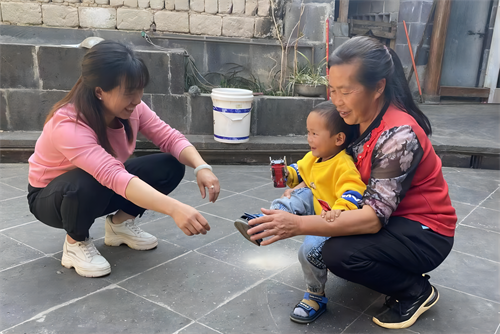
The Center for Experimental Economics in Education at Shaanxi Normal University summarized the challenges faced the development of infants and toddlers aged 0-4 in the less developed regions of China through a tracking study of several thousand infants and toddlers: half of the children in the sample area were at risk of delayed cognitive development and 52% of them were at risk of delayed language development, and the risk increased over time; there was a serious lack of knowledge about child rearing on the part of the caregivers, with only 13% of the caregivers telling stories to their infants and toddlers with storybooks, and 23.5% of the caregivers had a tendency to depression. Only 13% of caregivers use storybooks to read to infants and toddlers, and 23.5% of caregivers have depressive tendencies.
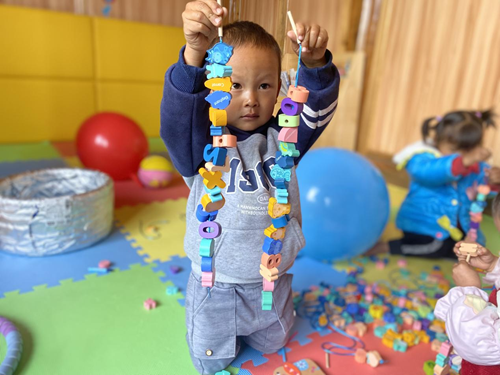
In recent years, as the issue of early life stage development has received more and more attention, relevant policies have been introduced from the national level to local governments, and more and more research institutes and social organisations are making a lot of useful attempts. HPP also explores appropriate methods to improve parenting and since the end of 2022 implements a scientific parenting service project for 0-4 years old in Tengchong City, Yunnan Province, focusing on the improved parenting skills of often elderly caretakers and early learning and responsive care for infants and toddlers aged 0-4 years old in rural areas.
Based on HPP Preschools of the Future project in Tengchong, we found that Qianqian's problems are quite common among infants and toddlers aged 0-4 years old in many villages, where parents are working outside the home and lack of companionship and interaction is common, and caregivers know little about early childhood development,.
The GenWell-HPP ‘Scientific Parenting and Child Development’ (SPCD) work under the Preschools of the Future project has reached three townships and six villages in the area for more than a year. By the end of 2023, the centers had been open for a total of 5,280 hours, organised training for librarian 147 times, and volunteers visited 1,382 households, all in all serving 125 young children and their families. young children and their families.
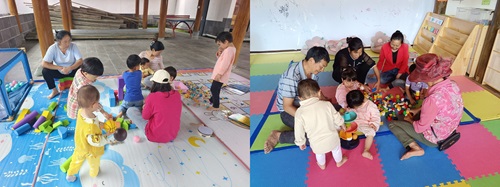
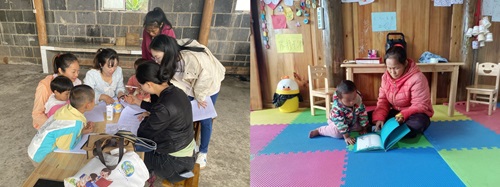
In the process of service, we have taken special measures for Qianqian's problems. The center volunteer found that Qianqian was easily attracted by toys, so she took her to play with blocks, beads and half a day later Qianqian was able to completely relax, and when the grandmother took her home, she leaft with a very shy smile and said bye-bye to the librarian.
Next day,Grandma brought Qianqian again, and the librarian again let Qianqian choose her favourite picture book and told the story to her. In the process of speaking, the volunteer deliberately slowed down the speed, word by word to guide Qianqian to follow the storyline of the picture book so she could think and answer. The volunteer found that the original Qianqian is not congenitally delayed in language development, but in the process of growing up with lacking the opportunity to communicate, which led to her late speech. That day back, the librarian specially explained to the grandmother how to accompany Qianqian, asked her to play more with her, talk to her more ....... In addition, the librarian also made home visits at regular times and parents are very happy and feel that HPP provides valuable learning opportunities for the healthy growth of children.
Grandma no longer goes to the activity room at the entrance of the village, and whenever she has time, she brings Qianqian to the center. She pays more attention to Qianqian's growth and development. Whatever the teacher says, Grandma will do when she gets home, and Grandma hopes to raise Qianqian better. Now, Qianqian likes to talk and laugh more.
With the extra company, Qianqian often likes to laugh and it is obvious that she is happy.
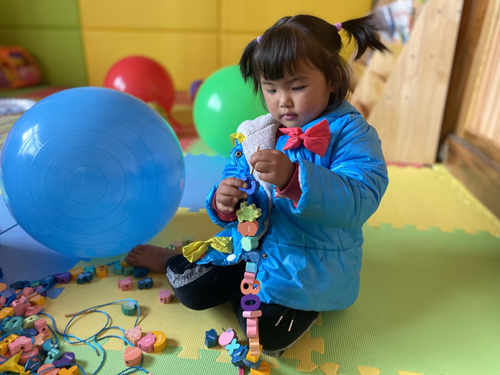
Speaking late, cognitive delays, underdevelopment, or timid characters ....... In response to the many problems of infants and toddlers aged 0-4 years old in the countryside, the head of the ‘GenWell-HPP center project focuses on infants and toddlers, and works with parents/caregivers to solve their problems and improve their knowledge and skills in scientific parenting. We call for love at the beginning of life, so that children can enjoy more joy and happiness.
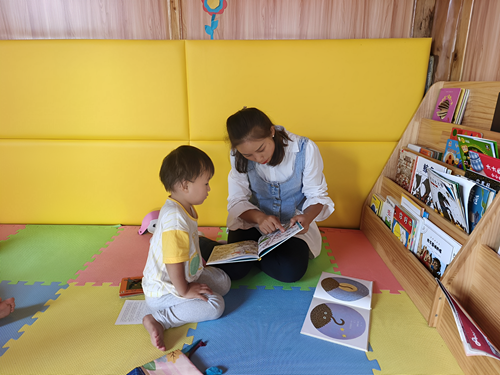
The implementation of the project has been recognised and affirmed by local government departments, communities and villagers, and the project has been taken as a pilot and a pioneer in local villages. Compared with the childcare institutions and early childhood education services in the urban areas, the rural areas are relatively lacking in resources and do not pay enough attention to the early development of children. The local government department expects to accumulate experience through the implementation of this project, explore the fit with the children's home, and create its own local characteristics of the community service model, to better serve the infants and toddlers aged 0-4 years old.
In the village, GenWell-HPP centers are attracting more and more villagers from neighbouring villages to bring their children there to play, and to provide good education and services to children through the center.
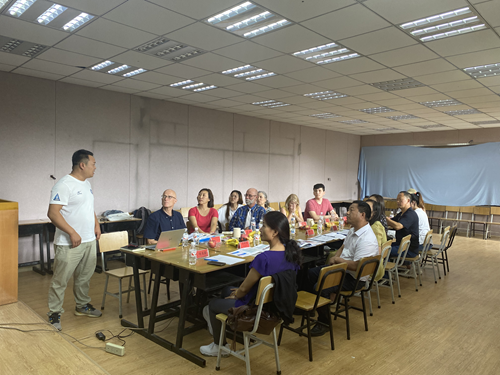
Seeing that the project has been recognised and accepted, we feel that this exploration and implementation is valuable and meaningful. Based on the needs of the development of infants and children aged 0-4 in remote rural areas across the country, HPP will continue to improve and develop the project model, aiming to mobilise the power of more social organisations and work with government departments to focus on improved parenting and care services for infants and children aged 0-4 in rural areas, helping more children to achieve joy and happiness and be better prepared for learning and preschool!
Project Description:
The Tengchong Genwell-HPP Community Center project is supported by GenWell Foundation and Planet Aid Inc. In cooperation with Tengchong Women's Federation and Tengchong Education and Sports Bureau, the project allocates village-level children's centers, recruiting and training child development and librarians, aiming to promote scientific parenting concepts and skills, improve community family education guidance services, strengthen scientific parenting publicity and advocacy, promote family construction and healthy development of children, and achieve sustainable development of rural children aged 0-4.
This project is supported by the Genwell Foundation.


This article represents the views of the author and does not represent the views or positions of the donor.